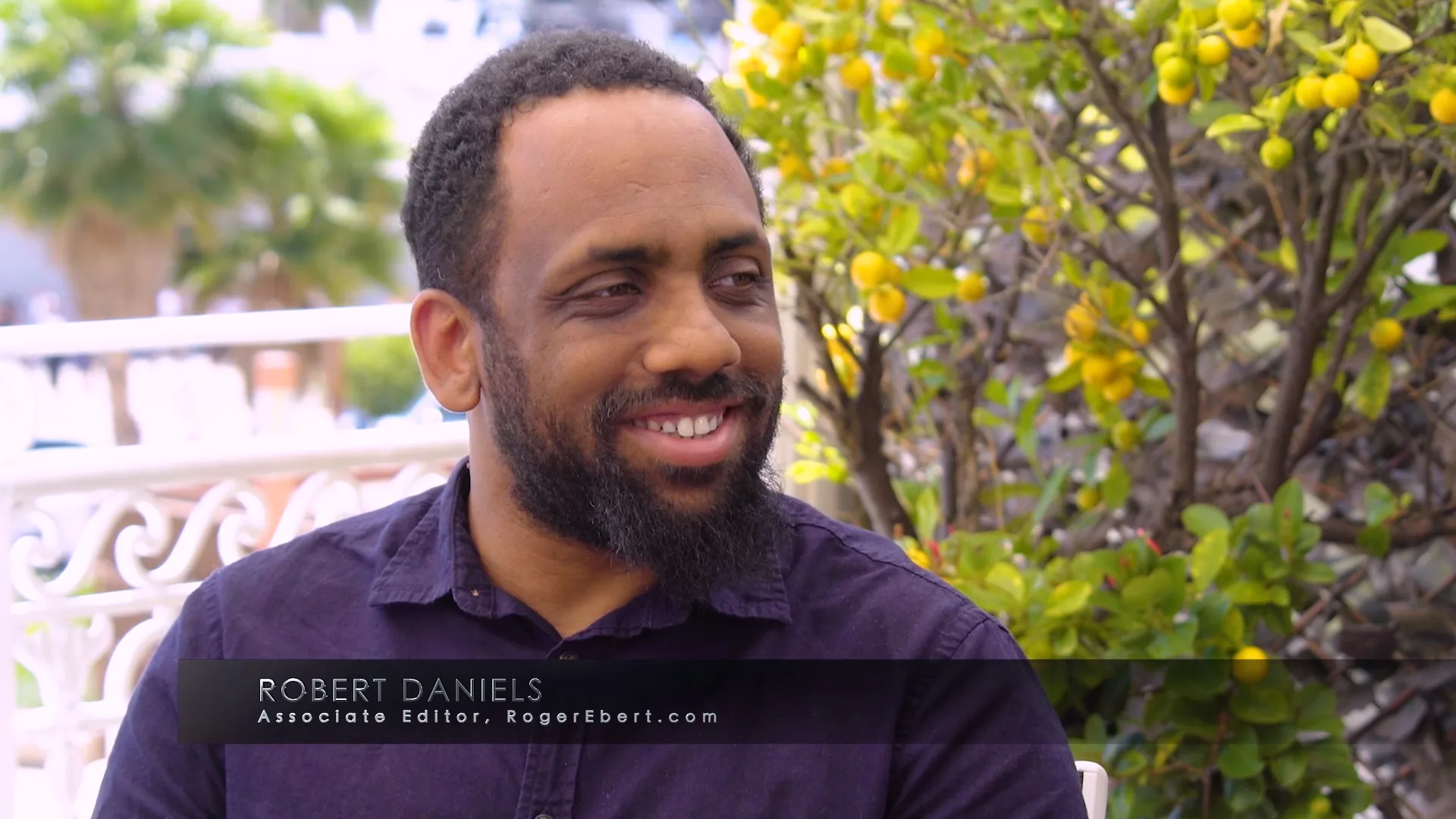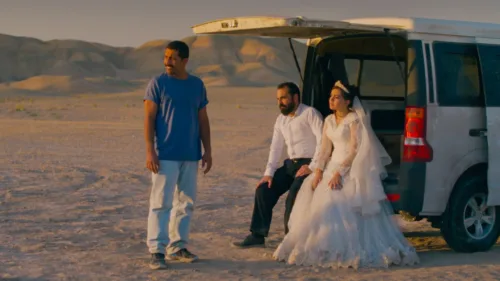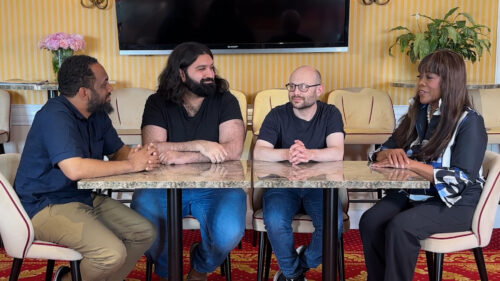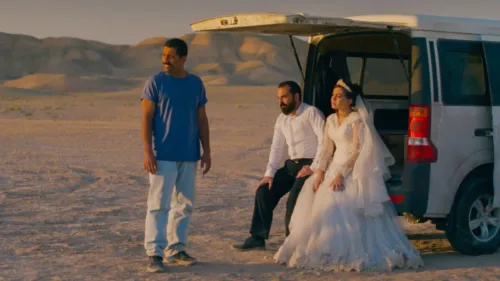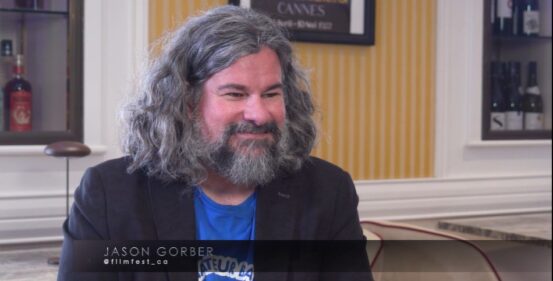The 2025 Cannes Film Festival is underway, and Chaz Ebert is on the ground to report on every development. In today’s video, Chaz sits in to talk with Associate Editor Robert Daniels to talk about the fest so far. Watch the video below.
Chaz:
Welcome back to our video series at Cannes. We promised you many reviews and so many exciting things. And we’re delivering on that promise. For instance, today I am talking to one of our film critics, Robert Daniels, and he’s going to tell us some of his favorite films so far at the festival. And also, I have a special question for him at the end, so stay tuned.
Mr. Robert, welcome.
Robert:
Oh, thanks. Thanks. It’s good to be back at Cannes. Yeah. It’s, it’s been it’s been really nice here.
Chaz:
So how have you found this Cannes as compared to previous years that you’ve been here?
Robert:
I think, well, this is my third year, and I think each year it’s been kind of a slow start. 2023, which was just just, you know, a sprint from start to finish. Last year was a very slow start, and it felt like we didn’t get the best movies until the very end. And you know, there have been some like glimmers in the first five days already.
Chaz:
What has been one of your favorite movies that you’ve seen at Cannes this year?
Robert:
Urchin.
Chaz:
Urchin? Tell me about. Or who’s the director?
Robert:
That’s actor Harris Dickerson, who is known for Babygirl and Triangle of Sadness. And it’s his directorial debut, and it’s playing and the Un Certain Regard section and stars Frank Dillane as a homeless drug addict who tries to clean up his life, and struggles to do so. And it’s an incredibly robust and muscular film.
Most actors and directors, I find usually when they’re first in their first film, usually they do a lot of close ups because they love actors. They love their faces. But Dickerson knows what an establishing shot is.
Chaz:
So he pulls the camera, he does it. Good, establishing shots.
Robert:
And then he lets the actors bodies fill the frame. And so, like, you get some close ups, but, the actors get to actually, like, fully use their body and their performances, and it’s it’s really just an incredible film, with so many ups and downs and twists and turns. And a really incredible lead performance by, Dillane, who I have really not seen in anything before this.
Yeah, he’s really is I think the discovery of the festival.
Chaz:
Okay. And do you did you feel that it was sort of an authentic portrayal of someone going through addiction or trying to clean their life up?
Robert:
You know, interesting. I’m always kind of wary of authenticity because, like, it’s such a moveable goalpost. You know, what’s authentic for one person is inauthentic for another. But I do think it’s a very sincere depiction of it. I do think it’s a very sincere depiction of addiction and the difficulty of overcoming, what’s actually fueling that addiction, the personal travails.
And so, it’s wonderfully affecting, but it’s also incredibly funny and surprisingly funny. It has a very dry sense of humor.
(URCHIN CLIP)
Chaz:
What else have you seen at the festival so far?
Robert:
I really liked Chie Hayakawa’s Renoir. It’s her second film. Her previous film, Plan 75, also debuted at Cannes. And Plan 75 ended up being Japan’s submission for the Academy Awards that year. And this follow up is a very personal story. It’s a coming of age story about a young girl who, during the summer, has to deal with her father dying from cancer.
And as I’m always a sucker for like a dad dying kind of movie. Especially since I lost my father almost ten years, actually, to the day. So it was very, very affecting. And I think it’s…. You can feel how personal the story is to her. Really, it’s a film filled with a lot of long takes.
I don’t want to say luxuriate, but we we stay with this girl, and we we are keen to her perspective.
Chaz:
In the film, she has almost an intuitive or psychic ability. Do you think that the film, from your point of view, do you think that she really did have those abilities, or do you think that it was something, a fantasy that she wish she had? How did that come off to you in the film? I’m curious because I’ve had some disagreements with some people about that point.
Robert:
Oh yeah. That’s interesting. I could compare it to another film that’s here, Left Handed Girl. I think in some ways, you know, also coming of age from a girl’s perspective, where I think we are really diving into the mindset of a child. And sometimes as a child, you know, when you’re going through a traumatic situation, like your imagination becomes your life raft, so to speak.
And I do think we’re in her, her dreams. I’m not necessarily sure she actually has those powers. Okay. I think she believes she has those powers.
Chaz:
Okay. And let me tell you why I felt that she did. Because my mother was an intuitive psychic, and when we grew up and when we played house or school or something, we would go into different rooms in the house. And one of the things you did is you would write something or draw a picture, and the person in the other room had to intuit to decipher what you were sending to them, and they had to write or draw it.
We thought that that was normal. We learned that not all kids did that. But when you grew up with a mother who was a psychic, you do that as some of the other things that she did readings, hypnosis. Things like that. Why would that grown up go to a little girl to hypnotize her, to bring out something about her father?
How do you explain that?
Robert:
Yeah, that’s that’s a good question. You know, I think there’s kind of a base level of trust, you know, that, like children in some way, like, are kind of separate from the world, right? Like, they haven’t really experienced all of, like, life’s worst that life is going to throw at them. You know, this child is experiencing something very traumatic.
And so there’s almost like this kind of feeling that, you know, they are kind of like an open door that you can kind of walk through that allows you to walk through. And so maybe that’s why, you know, see, you know, the, the grown up felt that trust.
Chaz:
All right. She actually had so much joy. Did you see her on the red carpet or anything? She clearly loves acting. She clearly loves the camera. The camera loves her. And I think we’re going to see a lot more from her.
Robert:
Yeah, I saw her when she was entering the Palais and she was just so excited and so happy and just, like, buoyant. Much like her character is really.
Chaz:
Exactly. Yes. Okay. What else did you see and like?
Robert:
Well, last night I saw the new Lynne Ramsay. Die, My Love, which is just a total assault on the senses, so to speak. It stars Jennifer Lawrence as a mother who is going through postpartum depression. And Robert Pattinson is her husband who is trying to pull his wife out of this tailspin that she’s in. And, yeah, I just found that to be so revelatory in terms of it’s the way that…
She wants you to feel. And I love movies that want you to feel, you know, thinking very, like, intellectual exercises. But sometimes I just wanted to react to that, like, you’re we are humans, and we should be, like, raw, open, vulnerable nerves. And that’s definitely what Lynne Ramsay is doing here. And the sound design is just so, like, overwhelming.
It almost kind of like, rattles into your soul.
Chaz:
Well, it did a little too much rattling that didn’t really get into my soul, but I have to say, because I’ve loved Lynne Ramsay’s films and I did not love this one. It annoyed me so much. And, you know, Jennifer Lawrence is a fine actor, and her acting was really good here, as was Robert Pattinson’s. But something about the film.
Maybe it’s because of the subject of postpartum depression. The way that it was handled here was, you know, we talk about kind of like an authenticity. I know they used to call it baby blues a long time ago. And then we as society did learn about postpartum depression and what you do for a woman who was going through that.
It’s evolved so much that I just didn’t buy this film and it just felt like almost an assault, rather than a revelation. So I just, I’m so sorry, Lynne. You know, you’re fine, filmmaker. It’s just not. This one was not my cup of tea.
Robert:
And do you think she’s going to keep the same cut? Because we’ve been. That’s been kind of a little discussion of like, because she was such a late addition to the schedule. And I think last time when she had,You Were Never Really Here. It was the same thing where she had a late edition. It was a late edition.
And then she recut it.
Chaz:
There is a really, really good movie there somewhere. I hope she finds it.
Jennifer Lawrence:
I mean, obviously as a mother, it was, it was really hard to kind of separate what I would do as opposed to what she would do, you know, and, and it was just heartbreaking. When I, when I first read the book, it was just such a devastating but powerful I Lynne said. It was dream like I had just had my, my firstborn.
And there’s not really anything like postpartum. It’s extremely isolating.
LaKeith Stanfield:
As a young man. Like, I don’t know if I really tapped in with how how it felt to be all the way alive. And then I read this and I felt like for the first time in a long time, I saw a mirror to what it felt to be truly alive and a creator. And, that was it was super beautiful.
And it just took me in and I had this. They kept having these visceral feelings, and I was like, I have to be a part of this. And I think, what we wanted to achieve, part of one of the things we wanted to achieve was to create this, ambiguity between reality and the dream world and what’s imagined versus what’s real.
And I thought that would be fun to explore. But it was also like a growth process for me. You know, I watched my wife give birth and go through, postpartum in a way that, you know, from the outside, it was difficult for me to really understand. And I think the metaphors here, the imagery, the music, the fighting, the love, the strife, the togetherness gave me a good sense of perspective, for something I otherwise wouldn’t have been able to understand.
And through the and through the journey, I was also able to laugh. It’s fucking funny, you know?
Sissy Spacek:
I think there’s an instant there’s a bond that she’s just not ever going to give up on that relationship and that child and this new lifeblood of of the family. Someone asked me last night, Oh, I don’t think they’re going to make it. And as the grandmother, I think they will I have I have to believe that that they will.
And I felt a glimmer of hope and positivity just a little flash of it in that. Cut last night. More so than in the script. I thought it’s going to it’s going to be okay.
Chaz:
And Sissy Spacek. Oh my God, I really did. I love Sissy Spacek in the movie.
Robert:
Yeah, I mean, those are those are the big three that I’m having. Like, yeah, they’ve been churning around in my mind.
Chaz:
I love talking to you about films and the way that you dissect them. I have a question, a more personal question for you. You know, we first started coming to this film festival, I don’t know whether it was 30 or 40 years ago with Roger and, Roger had a very special relationship with the Cannes Film Festival.
And I was wondering, did you ever read a review of his from Cannes or a movie that he had seen at Cannes that maybe had an influence on you in any way?
Robert:
Yeah. His review of, In the Mood for Love, which he didn’t review out of the festival, but he did see it here at Cannes.
Chaz:
That’s Wong Kar-wai?
Robert:
Yes, Wong Kar-wai. And I think it’s just, Roger’s poeticism comes through, especially in the first paragraph when he’s describing these two forlorn characters. And, you know, I think the hardest part about writing a review is starting it.
Chaz:
Yes, yes.
Robert:
Starting it and getting into the review. And I think Roger was always so fantastic at it, because sometimes he would just do something that seems so basic. Yes, I’ll just set the scene. What? Who are these two people? Why should we care about them? What’s you know, what draws us to them and what makes them special? And he was always so good at doing that.
Every so often when I’m stuck at home, I kind of go to something like, you know, his review of it In the Mood for Love. Okay, let’s get back to basics. Just set the scene.
Chaz:
Oh my God. I’m going to go back and reread In the Mood for Love just so I can touch base with that. Robert, thank you so much. And maybe we’ll maybe…Maybe we’ll do a critics roundtable again this year.
Robert:
Yeah. I’ll be I’ll be here the entire time.
Chaz:
Great. I would love to have you back. Thank you so much.
Throughout the festival, be sure to check in at RogerEbert.com for daily reports by our writers, along with our regular video reports. Until next time..au revoir!

